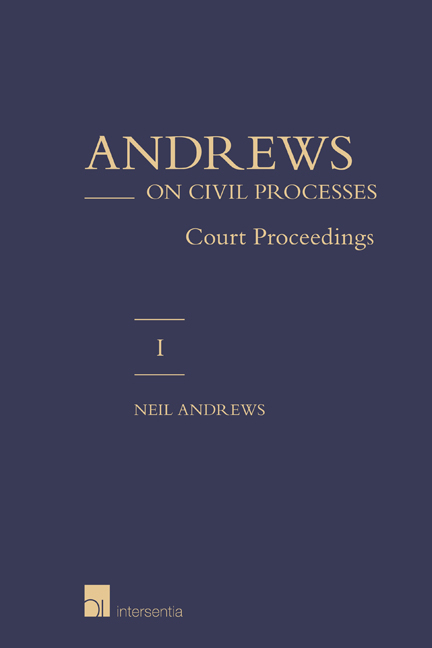Book contents
- Frontmatter
- Dedication
- Epigraph
- Preface
- Contents
- Table of Cases
- Table of Statutes
- Table of Statutory Instruments
- PART I INTRODUCTION TO THE FORMS OF CIVIL JUSTICE
- Chapter 1 Introduction
- Chapter 2 Sources of English Civil Procedure
- Chapter 3 The Big Picture’: Interaction of the Court System and Other Forms of Dispute Resolution
- PART II COMMENCEMENT OF COURT PROCEEDINGS AND PREPARATION FOR TRIAL
- PART III END-GAME: TRIAL, APPEAL, FINALITY AND ENFORCEMENT
- PART IV COSTS AND FINANCING OF LITIGATION
- PART V SPECIAL PROCEEDINGS
- PART VI PRINCIPLES OF CIVIL LITIGATION
- PART VII THE EUROPEAN CONTEXT
- Select Bibliography
- Index to Volumes I and II
Chapter 1 - Introduction
from PART I - INTRODUCTION TO THE FORMS OF CIVIL JUSTICE
Published online by Cambridge University Press: 13 December 2017
- Frontmatter
- Dedication
- Epigraph
- Preface
- Contents
- Table of Cases
- Table of Statutes
- Table of Statutory Instruments
- PART I INTRODUCTION TO THE FORMS OF CIVIL JUSTICE
- Chapter 1 Introduction
- Chapter 2 Sources of English Civil Procedure
- Chapter 3 The Big Picture’: Interaction of the Court System and Other Forms of Dispute Resolution
- PART II COMMENCEMENT OF COURT PROCEEDINGS AND PREPARATION FOR TRIAL
- PART III END-GAME: TRIAL, APPEAL, FINALITY AND ENFORCEMENT
- PART IV COSTS AND FINANCING OF LITIGATION
- PART V SPECIAL PROCEEDINGS
- PART VI PRINCIPLES OF CIVIL LITIGATION
- PART VII THE EUROPEAN CONTEXT
- Select Bibliography
- Index to Volumes I and II
Summary
THE FOUR FORMS OF CIVIL JUSTICE
NATURE OF CIVIL JUSTICE
Civil justice comprises the various processes enabling disputants to resolve, or at least terminate or narrow, their disputes. ‘Processes’ should be accorded a wide reference and should not be confined to systems supported directly by national legal systems and national governments. In this wider sense, civil disputes can be adjudicated by courts, resolved by arbitration, settled by mediation, or the parties can spontaneously reach unmediated agreements of settlement. Hence there are ‘four main forms of civil justice’: (i) the judicial process, involving court proceedings; (ii) arbitration; (iii) mediation; and (iv) (unmediated) settlement.
DISTINGUISHING THE FOUR FORMS OF CIVIL JUSTICE
Does the Process Involve a (Neutral) Third Party?
It will be noted that court proceedings, arbitration, and mediation involve the intervention of a neutral third party. Unmediated settlement does not result from, nor need it be in any respect facilitated or induced by, the direct intervention of a judge, arbitrator, or mediator. In that sense it is an autonomous and informal style of dispute-resolution. However, if the settlement occurs aft er commencement of court or arbitral proceedings, it will be common for the parties to seek a consent judgment by the court, or its arbitral equivalent, in order to give (further) effect to the settlement (14.86).
Is a Decision Imposed or Instead an Agreement Reached?
Mediation (1.01 ff, vol II) differs from court proceedings and arbitration because the mediator does not (unlike the court or arbitral tribunal) impose a solution or decision. Instead the mediator merely endeavours to assist parties to reach accord.
Is It a Public or Private Process?
Information confidentially disclosed during settlement negotiations, whether or not involving mediation, is protected by the ‘without prejudice’ privilege. This imposes an external shell of protection and an internal bond of secrecy: thus the parties’ discussions enjoy a high level of protection from outside scrutiny (12.49), and neither party enjoys the unilateral right to disclose or make use of that information. To do so he must instead obtain the other party's consent.
- Type
- Chapter
- Information
- Andrews on Civil ProcessesCourt Proceedings, pp. 3 - 30Publisher: IntersentiaPrint publication year: 2013

